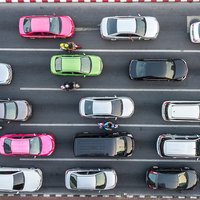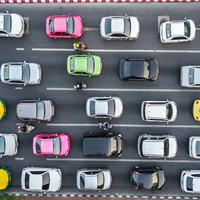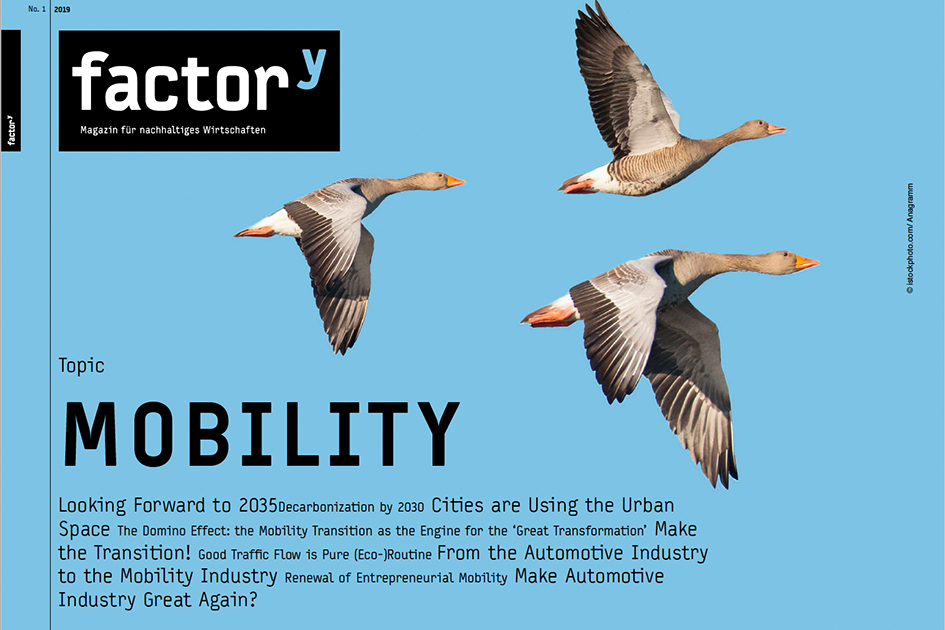Mobility's Future
FactorY magazine on mobility in English published

FactorY magazine on mobility in English published


In Germany no topic is as controversial and at the same time as popular as mobility. For some it is really necessary, for others a great pleasure. However, because emissions continue to rise in the transport sector, the industry is under pressure. There are great fears of change, but future-proof mobility brings more quality of life than stopping this key turning point. This is demonstrated by the new FactorY magazine Mobility.
The first issue "Mobility" from 2019 of the "FactorY – Magazine for sustainable economy" is now available for download in English. The magazine deals with innovative approaches that decarbonise traffic and with alternatives for daily progress. The magazine is dedicated to the state of development and the possibilities of controlling a future-oriented traffic turn and aims to convey positive images of change.
The strategies for the changing cities range from city congestion charge and free local transport to car-free days. Bicycle highways, streetcars and electric busses are also part of the strategy. Thorsten Koska, Co-Head of Research Unit Mobility and Transport Policy in the Energy, Transport and Climate Policy Division at the Wuppertal Institute, and Prof. Dr. Stephan Rammler from the Institute for Transportation Design show in their article "Cities Use the Space" (page 16) that municipal administrations and the urban economy can do a lot for the attractiveness of this range of options by creating their own transport transition, which is driven by the citizens.
Prof. Dr. Uwe Schneidewind, President of the Wuppertal Institute, stresses in his article "The Domino Effect" (page 23) that the change of today's car-dependent society is like a domino for a "Great Transformation". "There is hardly any field that is as intensively linked to the other key 'transitions' to a sustainable society, and there is no other field with such a close connection with the specific functionalities of the current economy. the transport sector," says Schneidewind. Therefore, "future literacy" in the area of mobility goes far beyond.
In the article "Good traffic is all about eco-routine" (page 36), Dr. Michael Kopatz, Project Co-ordinator in the Research Unit Energy Policy in the Division of Energy, Transport and Climate Policy at the Wuppertal Institute, discusses how "eco-routine" concepts can be used to consistently initiate a change in transport patterns. If, for example, roads and airports were not extended, but bus and train connections were, this would be the first step towards sufficient mobility. Construction and the transportation industry would still have enough to do.
The article "From the Automotive Industry to the Mobility Industry" (page 43) by Oliver Lah, Head of the Research Unit Mobility and International Cooperation in the Division of Energy, Transport and Climate Policy at the Wuppertal Institute, describes how the focus on traditional drives in business models and value chains influences the transformation of the automotive industry into sustainable mobility service providers. With the mobility transition at hand, this share is going to decrease, in part due to changes in drive formats. On the other hand it could also increase again by acting as a mobility service provider. Oliver Lah shows how future models for companies and employees can look like and how the state is able to facilitate the exit via industrial policy.
The route to work, business travel, the vehicle fleet: Nowadays a good corporate mobility management (CMM) organises these aspects in an efficient and sustainable way. In this context, the companies do not only take care of their employees, they also reduce emissions and resource consumption. Municipalities and regions can easily support CMM-initiatives and profit from them as well. In the article "A new Perspective on Entrepreneurial Mobility" (page 49), the authors Alina Susann Ulrich and Carolin Schäfer-Sparenberg from the Energy, Transport and Climate Policy Division at the Wuppertal Institute show how it can be done by using the example of the Bergisches Städtedreieck region.
These and other articles on mobility can be found in the English edition of the FactorY which is available free of charge under the link below. The FactorY magazine is published by the Efficiency Agency NRW and the Wuppertal Institute.
